Astrology is an ancient and complex system of divination that has fascinated humans for centuries. It involves the study of celestial bodies, such as planets and stars, to gain insight into people’s personalities and life events. One popular tool in astrology is the horoscope, which is essentially a map of the sky drawn for a specific date, time, and location.
A horoscope provides valuable information about an individual’s character traits, strengths, weaknesses, challenges, and opportunities. It does this by examining the positions of planets at various points in time throughout one’s life.
The interpretations derived from this data can be incredibly enlightening and helpful in personal growth. One key aspect of interpreting a horoscope is conjunctions – when two or more planets appear close together in the same sign or house.
Conjunctions offer unique insights into how different energies combine within an individual’s chart and ultimately impact their life experience. In this article, we’ll explore what conjunctions mean in astrology and how they contribute to our understanding of ourselves and others.
Introduce the topic of conjunctions
While many aspects play a role in shaping one’s destiny as per astrology, the conjunction aspect carries great significance among astrologers worldwide. In simplest terms – when two or more planets come together within your chart- they create what’s called a conjunction.
Conjunctions happen due to planetary alignment occurring at particular angles within one’s horoscope chart- be it two planets being placed on either side of another planet’s position or next to each other on the same degree line- everything counts towards forming a ‘conjunction’ formation scenario. Consequently –a person with multiple planet conjunct formations can expect all planet energies to be tied together to work beneath one roof, creating somewhat potent energy interactions with far-reaching implications where numerous positive traits benefit from any given set of planets in conjunction formation.
What is a conjunction?
Astrology is a complex field that aims to help us understand the universe and our place in it. One of the most essential concepts in astrology is conjunction. In simple terms, a conjunction occurs when two or more planets are located close to each other in the same sign or house in an individual’s horoscope.
A conjunction is considered a powerful aspect because it merges the energy of two or more planets, creating a new force that can significantly influence an individual’s life. Moreover, if two planets are located very close, they can combine their energies and create a new astrological entity with its own distinct characteristics.
In astrology, there are many types of conjunctions depending on which celestial bodies are involved and where they are located in relation to each other. Every kind of conjunction uniquely affects an individual’s life, depending on which houses or signs they occupy and how they interact with other aspects of their horoscope.
Define what a conjunction is in astrology.
Simply put, a conjunction occurs when two or more planets align with the same degree of longitude from Earth. This event creates an intense concentration of energy that can significantly affect an individual’s personality traits, relationships, career prospects, and even physical health.
The location of conjunction within an individual’s birth chart can reveal much about their character traits and how they experience life events. For example, suppose two planets associated with creativity (such as Venus and Neptune) were closely aligned in one’s horoscope at birth. In that case, it might suggest that this person has solid artistic abilities but may struggle with practical matters like financial management.
Explain how it occurs when two or more planets are close to each other in the same sign or house.
Conjunctions occur when multiple celestial bodies (usually planets) are located in close proximity to one another in an individual’s horoscope chart. The planets can be in the same sign, house, or both.
The closer the planets are to one another, the more powerful their combined energy will be. When two or more planets are conjunct, they share similar qualities and traits that will influence the individual’s life in different ways depending on which planets are involved and where they are located within the chart.
For instance, a conjunction of Mars and Jupiter could indicate that an individual has strong leadership qualities and a desire for adventure. A conjunction is an essential astrological aspect that occurs when two or more celestial bodies come together nearby within an individual’s horoscope chart.
The effects of conjunction depend on many factors, such as which planets are involved and where they are located within the chart. Understanding how to interpret these influences is crucial for unlocking deeper insights into one’s character and future prospects.
Different Types of Conjunctions
The Sun-Moon Conjunction: Balancing One’s Inner and Outer Worlds
The Sun-Moon conjunction is one of the most common conjunctions in a horoscope. It occurs when the Sun and Moon are in the same sign, and it is said to represent the union of one’s inner and outer worlds.
This conjunction indicates someone confident, assertive, and strong sense of self. However, this person may struggle to balance their emotional needs with their desire for achievement.
When the Sun-Moon conjunction happens in a person’s career house, they may have a strong drive to succeed but struggle with burnout or stress. In relationships, this conjunction may indicate that someone seeks partners who complement their strengths and challenge them to work on their weaknesses.
The Venus-Mars Conjunction: Passionate Relationships and Creative Expression
The Venus-Mars conjunction occurs when these two planets are close together in a horoscope. This aspect represents passion, creativity, and sexual attraction. People with this conjunction tend to be charismatic and magnetic to others.
In love relationships, this aspect indicates an intense connection between partners that can lead to passionate romance or fiery arguments. This aspect can bring success through originality or unique ideas in creative pursuits or career paths related to art or entertainment.
The Jupiter-Saturn Conjunction: Balance Between Expansion and Discipline
The Jupiter-Saturn conjunction is less common than other types of planetary alignments but is significant in its effects on personal growth. This aspect represents the balance between expansion (Jupiter) and discipline (Saturn). People born under this alignment tend to be ambitious but realistic about their goals.
They have a long-term plan for success that considers both risk-taking (Jupiter) and practicality (Saturn). This aspect may indicate a balance between growth and stability in relationships or partnerships.
Overall, the different conjunctions in a horoscope provide insight into various aspects of a person’s life, including relationships, career aspirations, and personal growth. Understanding the effects of these planetary alignments can help individuals make informed decisions about their lives and pursue their goals with greater clarity and purpose.
Interpretation of conjunctions
Astrologers use conjunctions to gain insight into a person’s personality traits and life events. When two planets are conjunct, they work together, combining their energies to create a unique effect. Depending on which planets are in conjunction and their placement in the horoscope, astrologers can predict various aspects of the individual’s life.
For example, if someone has a Venus-Mars conjunction in their horoscope, it indicates that the energy of Venus (love and harmony) combines with that of Mars (passion and desire). This combination suggests that the individual may have intense relationships with others marked by passion and harmony.
They may also be motivated by their desires to pursue creative projects or hobbies. On the other hand, if someone has a Saturn-Pluto conjunction in their chart, this combination indicates an intense focus on power and control.
These individuals may be drawn to leadership roles or positions of authority and can quickly become obsessed with achieving power at all costs. The interpretation of conjunct placements is complex since it depends on which planets are involved in the aspect.
There is no one-size-fits-all approach since each planet represents different areas of life. An experienced astrologer can consider all planetary movements when making conclusions about an individual’s life events.
Example interpretations
A Sun-Mercury conjunction can indicate someone with solid communication skills and self-confidence. This placement often suggests someone who is intelligent, articulate, and has excellent mental clarity. Moon-Jupiter conjunction often reflects an optimistic outlook with innate wisdom about how people work together for common goals in social situations.
People born under this aspect tend to be intuitive regarding emotional matters but also have great faith that things will work out for them. When Uranus is conjunct with Neptune, you might find somebody who is highly imaginative, with a strong sense of idealism and a tendency to feel emotionally drawn to unorthodox or progressive ideas.
However, they must stay grounded in reality since the conjunction often makes it hard to see things objectively. Understanding the interpretation of conjunctions in astrology can provide valuable insights into an individual’s personality traits and life events.
Astrologers use these aspects to understand the energy that works together in an individual’s chart. By analyzing the placement of each planet, astrologers can make predictions about various aspects of an individual’s life.
Other Factors to Consider
While conjunctions are essential to horoscope interpretation, it’s important not to focus too heavily on them and neglect other factors in a person’s chart. A conjunction may indicate a strong influence between two planets, but interactions with other planets give a complete picture of an individual’s personality and life experiences.
Transits and progressions are two such factors that can significantly affect the effects of a particular conjunction. Transits occur when a planet in the current sky makes an aspect to a planet in one’s natal chart. At the same time, progressions involve the gradual movement of one’s natal planets through different signs and houses over time.
The Influence of Transits
Transits can have a significant impact on how conjunctions manifest in our lives. For example, suppose someone has a Sun-Mercury conjunction in their natal chart, indicating strong communication skills. In that case, they may experience heightened communication abilities during times when transiting Mercury is making aspects to their natal Sun or Mercury. On the other hand, if transiting Saturn is making challenging aspects to this conjunction, they may struggle with self-expression or experience challenges related to communication.
It’s worth noting that transits alone do not determine our fate – instead, they serve as potential influences so we can choose how to respond to them. Being aware of upcoming transits can help us prepare for potential challenges or opportunities related to specific areas of life indicated by our personal horoscope.
The Gradual Movement of Progressions
Progressions involve gradual changes in one’s horoscope over time as natal planets move through different signs and houses at a rate determined by each planet’s speed. Aspects between progressed planets and natal ones can significantly affect how we experience planetary energies indicated by our natal chart, including conjunctions.
For example, suppose someone has a Venus-Mars conjunction in their natal chart, indicating strong passion and desire. In that case, they may experience a shift in their approach to relationships as Venus progresses into a new sign or house. This could manifest as a desire for more stability or commitment in romantic partnerships or a renewed focus on creative pursuits that bring them pleasure and satisfaction.
Ultimately, the key to understanding the influence of conjunctions and other factors in our horoscope is approaching our chart with an open mind and willingness to learn. By considering all the aspects of our chart – including transits, progressions, and other placements – we can gain greater insight into ourselves and how we can best navigate life’s challenges and opportunities.
Conclusion: Making Sense of Conjunctions in Your Horoscope
Throughout this article, we have explored the concept of conjunctions and their significance in horoscope interpretation. We have learned that a conjunction occurs when two or more planets are close to each other in the same sign or house. Different types of conjunctions can affect different areas of life, such as relationships, careers, and personal growth.
We have also discussed how astrologers interpret conjunctions to gain insight into a person’s personality traits and life events. We also provided examples of how different combinations of planets in conjunction can affect an individual’s life. However, it is essential to remember that while conjunctions are important, they should not be considered in isolation from other aspects and placements in a person’s horoscope.
Other factors, such as transits and progressions, can also influence the effects of a particular conjunction. It is essential to seek guidance from a professional astrologer who can provide an accurate interpretation based on your unique birth chart.
Understanding your birth chart can help you gain insight into your strengths, weaknesses, opportunities, challenges, and potential paths for personal growth. Knowing what conjunction mean in a horoscope can add depth to our understanding of astrology.
We hope this article has shed some light on this fascinating topic and inspired you to explore it further. May the stars guide you toward fulfilling your highest destiny!




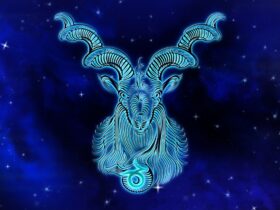
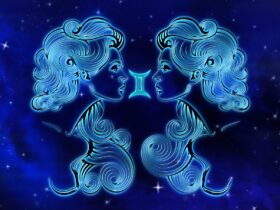
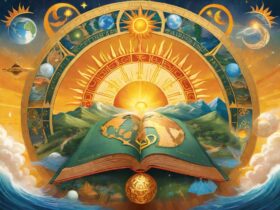
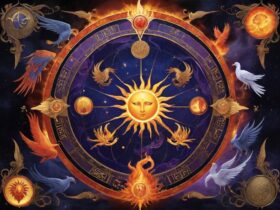
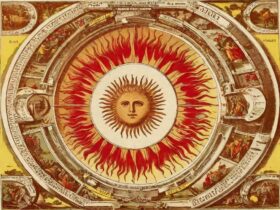
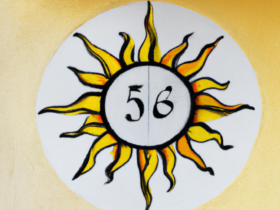
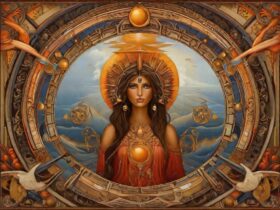








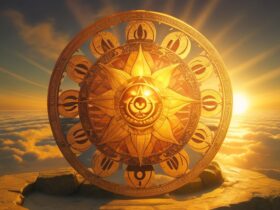
Leave a Reply